Revolutionizing Healthcare: Top 7 Innovations Shaping the Future of Medicine
Welcome to “Revolutionizing Healthcare: Top 10 Innovations Shaping the Future of Medicine.” In this exploration, we embark on a journey through groundbreaking advancements that are redefining healthcare. These innovations hold the promise of transforming patient care, medical research, and the very essence of the healthcare industry, ushering in a new era of possibilities.
Revolutionizing Healthcare: Top 10 Innovations Shaping the Future of Medicine
Telemedicine and Remote Care
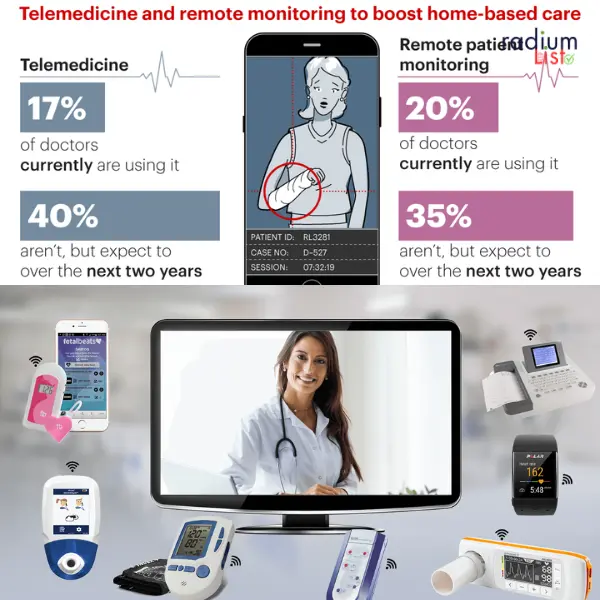
Telemedicine and Remote Care: Transforming Healthcare Access
Telemedicine and remote care are revolutionizing healthcare by redefining how patients access medical services and enhancing the delivery of healthcare. These innovations leverage digital technology to bridge geographical gaps, increase accessibility, and provide more convenient healthcare solutions.
Accessible Healthcare Anywhere, Anytime
Telemedicine enables patients to connect with Healthcare professionals remotely through video calls, Phone calls, or secure messaging platforms. This accessibility is particularly crucial for individuals in remote areas or those with limited mobility. Patients can receive medical advice, consultations & even prescriptions without the need for in-person visits.
Improved Healthcare Accessibility
Telemedicine eliminates geographical barriers, Allowing patients to consult with specialists or Healthcare providers regardless of their location. This has a profound impact on underserved communities, where access to healthcare services is often limited. Patients in rural or remote areas can now receive timely medical guidance and expertise.
Convenience and Reduced Wait Times
One of the primary benefit’s of telemedicine is its convenience. Patients can schedule virtual appointments at times that suit their schedules. Reducing the need for long wait times in crowded waiting rooms. This not only saves time but also enhances the overall patient experience.
Remote Monitoring for Chronic Conditions
Remote care goes beyond virtual consultations. It includes remote monitoring of patients with chronic conditions using wearable devices & connected healthcare technology. Patients can transmit vital signs, such as blood pressure, glucose levels, and heart rate, to their healthcare providers in real time. This proactive approach enables early intervention and personalized care plans.
Enhanced Healthcare Efficiency
Telemedicine also improves healthcare efficiency by reducing administrative burdens and streamlining processes. Electronic health records (EHRs) facilitate secure data sharing and reduce paperwork. Healthcare providers can focus more on patient care rather than administrative tasks.
Challenges and Future Developments
While telemedicine has made significant strides, challenges such as regulatory hurdles, reimbursement policies, and ensuring the privacy & security of patient data still need to be addressed. As technology continues to advance, telemedicine & remote care are poised to play an increasingly vital role in healthcare, offering convenient, Efficient & accessible healthcare solutions for patients worldwide.
In conclusion, telemedicine & remote care are transforming healthcare by breaking down barriers, Increasing accessibility & enhancing the overall patient experience. These innovations are not only changing the way patients access medical services but are also contributing to more efficient & effective Healthcare delivery systems. As technology continues to evolve, Telemedicine will play an increasingly central role in the future of healthcare.
AI in Diagnostics
AI in Diagnostics: Revolutionizing Medical Decision-Making
Artificial Intelligence (AI) is ushering in a new era in medical diagnostics, fundamentally changing how healthcare professionals interpret and utilize patient data. From image analysis to predictive analytics, AI-powered diagnostics offer unprecedented accuracy, efficiency, and potential for early disease detection and treatment planning.
Medical Imaging Enhancement
One of the most significant contributions of AI in diagnostics is its role in medical imaging. AI algorithms, particularly deep learning models. Have shown remarkable abilities in analyzing medical images such as X-rays, MRIs, & CT scans. These algorithms can identify abnormalities, Tumors, Fractures, & anomalies with a level of accuracy that rivals or surpasses human experts. The result is faster, more accurate diagnoses, Enabling timely interventions & treatment decisions.
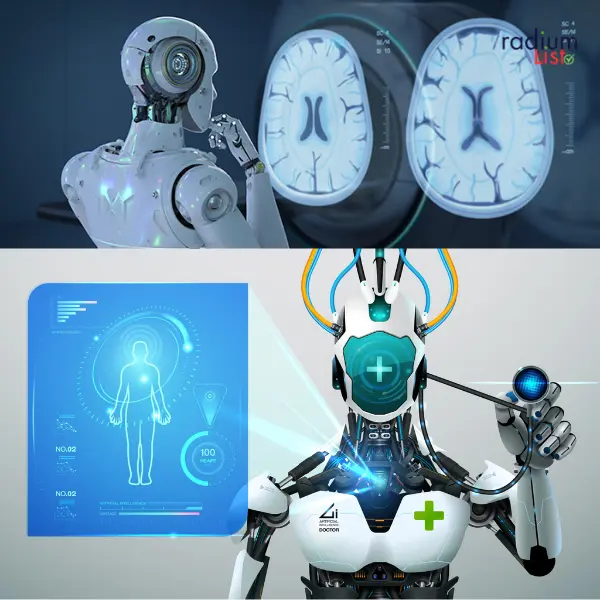
Early Disease Detection
AI excels in early disease detection and risk assessment. Machine learning models can analyze vast datasets, identifying subtle patterns and biomarkers that might be missed by human clinicians. This is particularly valuable in diseases like cancer, where early detection significantly improves treatment outcomes. AI-driven predictive analytics can stratify patients based on their risk profiles, allowing for proactive interventions and personalized treatment plans.
Efficiency and Reduced Diagnostic Errors
AI doesn’t suffer from fatigue or bias, making it an ideal partner for healthcare professionals. AI-driven diagnostic tools can assist in reviewing and triaging patient data, allowing physicians to focus on complex cases. This improves efficiency in healthcare delivery and reduces diagnostic errors, enhancing patient safety.
Remote Diagnostics
AI-powered diagnostic tools are also enabling remote healthcare delivery. Telemedicine platforms equipped with AI diagnostics can connect patients with healthcare professionals, even in remote or underserved areas. Patients can receive preliminary diagnoses and treatment recommendations without leaving their homes.
Challenges and Future Directions
Despite its transformative potential, AI in diagnostics faces challenges such as data privacy concerns, regulatory frameworks, and the need for ongoing training & validation of AI algorithms. However, these challenges are being actively addressed.
The future of AI in diagnostics is promising. As AI models continue to improve with more extensive datasets and advanced algorithms, they will become integral to the diagnostic process. Combining the expertise of healthcare professionals with the analytical power of AI will result in more accurate, Efficient & patient-centric healthcare. AI-driven diagnostics will play a pivotal role in shaping the future of medicine, Enhancing healthcare outcomes & improving overall patient care.
CRISPR Gene Editing
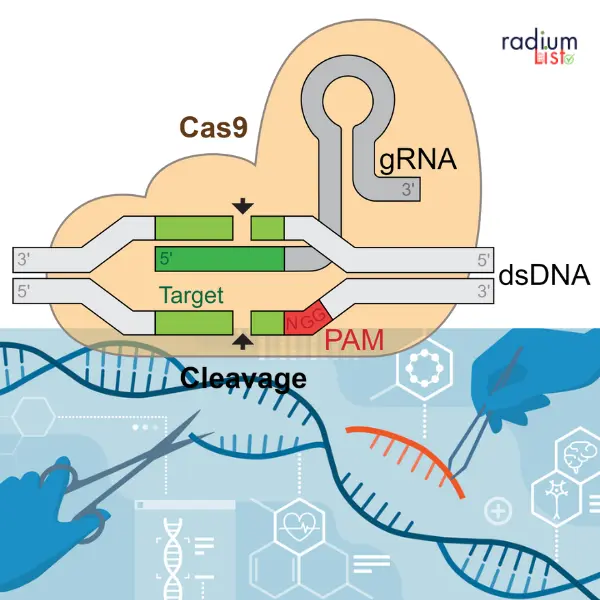
CRISPR Gene Editing: Unlocking the Potential of Genetic Medicine
CRISPR Clustered Regularly Interspaced Short Palindromic Repeats gene editing technology has emerged as a revolutionary force in the realm of genetic medicine. With its precision & versatility, CRISPR has the potential to treat genetic diseases & drive groundbreaking genetic research, Reshaping the future of medicine.
The CRISPR-CAS9 Toolkit
At the hearts of CRISPR’s power lies the CRISPR CAS9 system. It serves as a molecular toolkit that allows scientists to target specific genes within an organism’s DNA. The Cas9 enzyme, Guided by an RNA molecule designed to match the target gene, can cut the DNA at precise locations. This incision can then be repaired by the cell’s natural repair machinery, Introducing desired genetic changes in the process.
Treating Genetic Diseases
CRISPR offers a beacon of hope for individuals living with genetic disorders. It holds the promise of correcting genetic mutations responsible for conditions like sickle cell anemia, Cystic fibrosis & muscular dystrophy. By repairing or replacing faulty genes, CRISPR-based therapies may provide effective treatments or even cures for these previously incurable diseases.
Advancing Genetic Research
Beyond its therapeutic potential, CRISPR is a game-changer in genetic research. Scientists can use CRISPR to create genetically modified organisms for studying the functions of specific genes. It allows for precise manipulation of DNA, facilitating investigations into genetic causes of diseases, Drug development & the understanding of fundamental biological processes.
Ethical Considerations & Challenges
The incredible promise of CRISPR gene editing comes with ethical & safety considerations. The potential for unintended genetic changes, known as off-target effects, Raises concerns. Ethical discussions surround the use of CRISPR for purposes such as human germline editing, demanding careful regulation & ethical guidelines.
The Future of Genetic Medicine
As CRISPR technology continues to advance, its potential in treating genetic diseases & advancing genetic research becomes increasingly evident. With responsible & ethical use, CRISPR has the potential to transform genetic medicine, Offering new hope to patients & unlocking deeper insights into the mysteries of our genetic code.
Immunotherapy Advancements
Immunotherapy Advancements: Empowering the Immune System Against Cancer
Immunotherapy represents a groundbreaking paradigm shift in the field of cancer treatment, Revolutionizing how we combat this formidable disease. This innovative approach harnesses the body’s own immune system to identify & destroy cancer cells, Offering new hope to patients & transforming the landscape of cancer therapy.
The Immune System’s Role
The immune system is a formidable defense mechanism that constantly patrols the body, Identifying & eliminating foreign invaders, including cancer cells. However. Cancer often evades detection by the immune system, allowing it to proliferate unchecked. Immunotherapy seeks to reawaken & enhance the immune system’s ability to recognize & attack cancer cells.
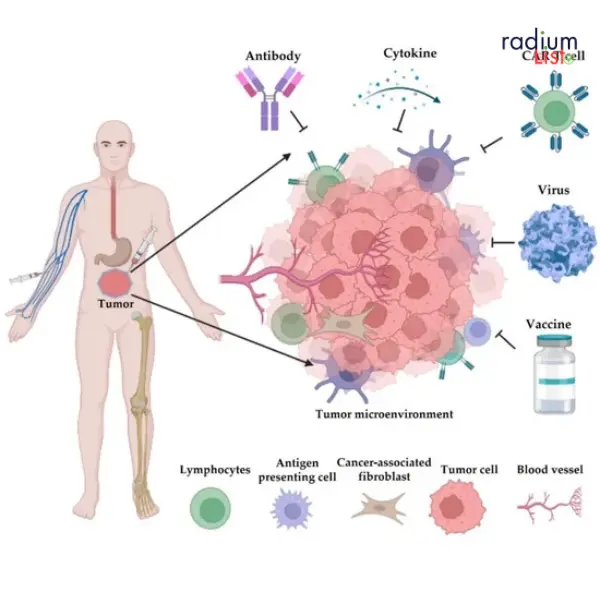
Checkpoint Inhibitors
One of the most prominent immunotherapy approaches involves checkpoint inhibitors. These drugs target specific proteins on the surface of immune cells & cancer cells, Effectively “unmasking” cancer cells to the immune system. This unleashes the immune response, allowing immune cells to recognize & Destroy cancer cells.
CAR-T Cell Therapy
Another transformative innovation in immunotherapy is CAR-T cell therapy. This personalized approach involves genetically engineering a patient’s own T cells to express chimeric antigen receptors (CARs) that can specifically target cancer cells. These supercharged immune cells are then reintroduced into the patient, where they seek out & destroy cancer cells.
Precision & Reduced Side Effects
Immunotherapy offers remarkable precision in cancer treatment. Unlike traditional treatments like chemotherapy, which can harm healthy cells along with cancer cells, immunotherapy is highly specific. This precision results in reduced side effects & improved quality of life for patients.
Ongoing Advancements
Immunotherapy continues to evolve with ongoing research & development. Combination therapies, Where multiple immunotherapy approaches are used together or with other treatment modalities, are showing promising results in further improving cancer outcomes.
A Brighter Future for Cancer Patients
Immunotherapy represents a beacon of hope for cancer patients. It has demonstrated remarkable success in treating a variety of cancers, Including melanoma, Lung cancer & blood cancers. While challenges remain, Such as managing side effects and expanding access to these treatments. The transformative impact of immunotherapy on cancer care cannot be overstated. It exemplifies the power of medical innovation in improving Patient outcomes & offering new possibilities in the fight against cancer.
3D Printing in Healthcare
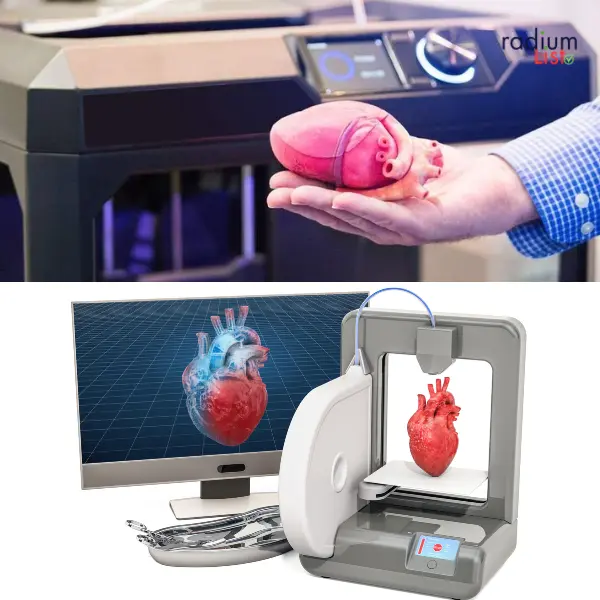
3D Printing in Healthcare: Shaping Personalized Medical Solutions
The convergence of 3D printing technology and healthcare has ushered in a transformative era where personalized medical solutions, from implants to even organs, are becoming a reality. This revolutionary approach offers patients customized treatments, shorter recovery times & enhanced healthcare outcomes.
Custom Implants & Prosthetics
One of the most significant contributions of 3D printing to healthcare is the ability to create custom implants & prosthetics. Using patient-specific anatomical data. Such as CT scans or MRIs, 3D printers can produce implants tailored to fit an individual’s unique anatomy. This precision reduces the risk of complications, Improves implant integration & enhances patient comfort.
Orthopedic Advancements
In orthopedics 3D printing is revolutionizing the creation of joint replacements & orthopedic implants. Patients receiving hip, kne,e or shoulder replacements can benefit from implants that mimic their natural joint structure, resulting in greater mobility and reduced pain.
Patient-Specific Surgical Guides
3D printing also aids surgeons in planning complex procedures. Patient-specific surgical guides, generated from 3D-printed models, provide surgeons with step-by-step instructions for precise implant placement or tumor removal. This improves surgical accuracy and reduces operation times.
Advancements in Dentistry
Dentistry has embraced 3D printing for producing crowns, bridges, & dental implants that precisely match a patient’s dental anatomy. This reduces the need for multiple appointments and improves the fit & function of dental restorations.
Bioprinting Organs and Tissues
Perhaps the most groundbreaking application of 3D printing in healthcare is bioprinting, Which involves the layer-by-layer construction of living tissues and organs. While still in the experimental phase, Bioprinting holds immense promise for addressing organ shortages and developing patient-specific organ transplants.
Challenges & Future Prospects
Despite its potential, 3D printing in healthcare faces challenges such as regulatory approval, material development, & cost-effectiveness. However, ongoing research and technological advancements are expected to address these hurdles, Paving the way for even greater integration of 3D printing in mainstream healthcare.
In conclusion, 3D printing in healthcare is reshaping the way personalized medical solutions are conceived & delivered. From custom implants to bioprinted organs, this technology empowers patients with treatments that are tailored to their specific needs, offering a brighter future for healthcare & patient outcomes.
Precision Medicine
Precision Medicine: Personalizing Healthcare for a Healthier Future
Precision medicine, A revolutionary approach to healthcare, Represents a paradigm shift from one-size-fits-all treatments to individualized, patient-centered care. At its core, precision medicine recognizes that each person’s genetic makeup, lifestyle, & medical history are unique, & treatment plans are meticulously tailored to address these specific factors.
The Essence of Precision Medicine
The foundation of precision medicine lies in genomics—the study of an individual’s genes & their interactions. By sequencing & analyzing a patient’s genome, Healthcare providers gain invaluable insights into their susceptibility to diseases, response to medications & the potential for genetic disorders. This information forms the basis for personalized treatment plans.
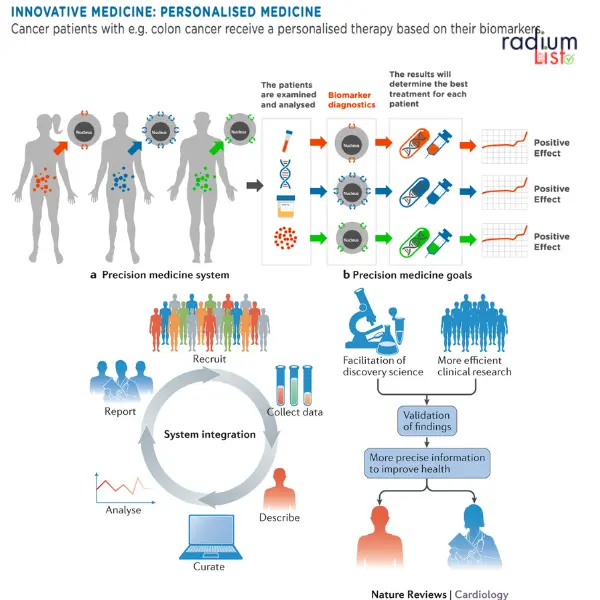
Customized Treatment Plans
In the realm of cancer treatment, precision medicine is particularly transformative. Rather than relying solely on traditional therapies like chemotherapy or radiation, oncologists can now pinpoint genetic mutations driving the cancer’s growth. This knowledge allows for the selection of targeted therapies that specifically address the genetic alterations, Enhancing treatment effectiveness & minimizing side effects.
Predictive Medicine
Precision medicine extends beyond treatment. It also encompasses risk assessment & disease prevention. By analyzing a person’s genetic predisposition, Healthcare professionals can predict their likelihood of developing certain conditions, Enabling proactive interventions & lifestyle adjustments to mitigate risks.
Chronic Disease Management
For individuals with chronic conditions like diabetes or heart disease, Precision medicine offers tailored management plans. Medication choices, dosages, & lifestyle recommendations can be fine-tuned based on an individual’s unique genetic & metabolic profile, leading to improved health outcomes & a higher quality of life.
Challenges and Ethical Considerations
Despite its promise, precision medicine faces challenges, including the need for extensive genetic data & the potential for genetic discrimination. Ethical concerns regarding data privacy and consent also require careful consideration as the field advances.
The Future of Healthcare
Precision medicine represents the future of healthcare—a future where treatments are as unique as the individuals receiving them. It empowers patients with information, Fosters proactive healthcare decision-making, & offers hope for more effective treatments, reduced side effects, & improved overall health outcomes. As technology and research in genomics continue to evolve, Precision medicine is poised to become an integral component of modern healthcare, Shaping a healthier future for all.
Health Wearables and IoT
Health Wearables and IoT: Empowering Continuous Health Monitoring & Self-Care
Health wearables & Internet of Things IoT technology have ushered in a new era of healthcare one that emphasizes continuous health monitoring, Proactive Self-care, & Real-time data-driven insights. These innovations offer individuals the ability to take charge of their health like never before.
Continuous Health Monitoring
Wearable devices, Such as smartwatches, Fitness trackers, & even smart clothing, are equipped with sensors that monitor various health metrics around the clock. These metrics can include heart rate, Sleep patterns, activity levels, & even blood oxygen levels. This continuous monitoring provides users with a holistic view of their health & wellness over time.
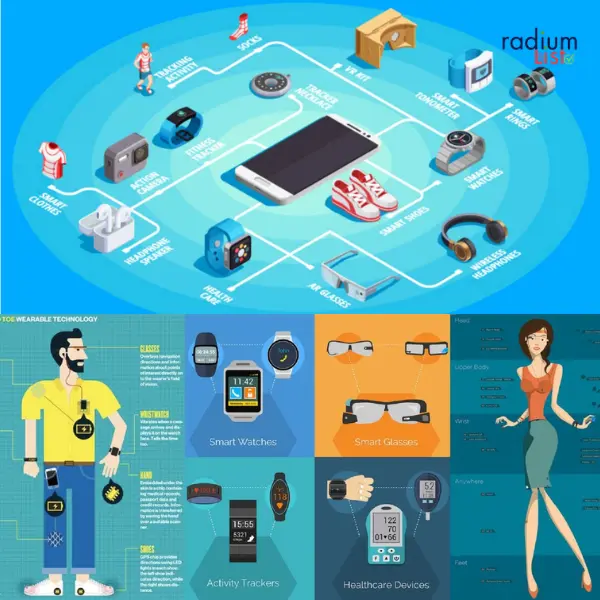
Early Detection and Prevention
One of the key advantages of health wearables and IoT devices is their ability to detect potential health issues early. Algorithms & machine learning models analyze the collected data to identify deviations from normal patterns. For example, an irregular heart rate or sudden changes in sleep quality may trigger alerts, prompting users to seek medical attention or make lifestyle adjustments.
Chronic Disease Management
For individuals with chronic conditions like diabetes or hypertension, health wearables & IoT devices play a pivotal role in disease management. Continuous glucose monitors, for instance, track blood sugar levels in real-time, allowing patients and healthcare providers to make timely decisions regarding medication and diet adjustments.
Promoting Active Lifestyles
Wearable fitness trackers encourage physical activity by setting daily step goals and providing immediate feedback on progress. These devices motivate users to adopt healthier habits, reduce sedentary behavior, & increase their overall fitness levels.
Telehealth and Remote Patient Monitoring
The data collected by health wearables can be seamlessly integrated into telehealth platforms, Allowing healthcare providers to remotely monitor patients health & adjust treatment plans as needed. This is particularly valuable for individuals with chronic diseases or those recovering from surgery.
Challenges and Future Prospects
Despite their numerous benefits, health wearables & IoT devices face challenges related to data security, data accuracy, & interoperability. As the technology continues to evolve, Addressing these challenges will be crucial to ensuring the widespread adoption of these devices in healthcare.
In conclusion, health wearables & IoT technology are transforming healthcare from a reactive system to a proactive one. By enabling continuous health monitoring & self-care, These innovations empower individuals to take control of their health. Leading to better health outcomes & improved overall well-being.
